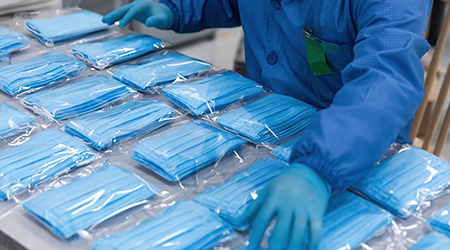A team of researchers at the University of Maryland (UMD) is developing a new type of personal protective equipment (PPE) that is far more comfortable than a surgical mask or N95 ventilator. The PPE is designed to benefit workers who face the discomfort and inconvenience of wearing masks for hours at a time.
As an alternative, a UMD team led by mechanical engineering professor Jelena Srebric is designing a solution in which a micro air cleaner supplies a constant flow of purified air to the user while creating an invisible air shield that can block ambient particles that could carry the virus that causes COVID-19.
In the approach being developed by Srebric and her colleagues, goggles are fitted with an airflow system that includes a micro fan and a high-efficiency particulate air (HEPA) filter to catch airborne particles. The device also includes a sensor that measures micro pressure, carbon dioxide, humidity, and temperature, allowing the device to be calibrated for a tight but comfortable fit. The device can be sterilized with ultraviolet light at the end of each day of use.
"The system is designed to address the discomfort and breathing difficulties that many people experience while wearing masks or ventilators for long periods of time," Srebric said.
"One of the major problems with currently available wearables, such as masks, is that they rely on the user's lungs to push air against the filtering surfaces. Over time, this places a lot of strain on the user and leads to discomfort. Our system solves this problem by including a micro fan. It provides a continuous local air flow, and self-monitors to ensure the pressure is at the right level," she said.
Srebric has focused much of her research during the past year on responding to the public health challenges posed by COVID-19. Together with colleagues at the University of Colorado, she has been leading a study that identifies ways to safely resume live music performances. During the presidential election in 2020, she collaborated with University of Maryland public health professor Donald Milton in devising a simple, low-cost solution that can protect against virus transmission at debates and other public events. She has also helped develop air filtration systems for public transportation.

 Healthcare and Resilience: A Pledge for Change
Healthcare and Resilience: A Pledge for Change Texas Health Resources Announces New Hospital for North McKinney
Texas Health Resources Announces New Hospital for North McKinney Cedar Point Health Falls Victim to Data Breach
Cedar Point Health Falls Victim to Data Breach Fire Protection in Healthcare: Why Active and Passive Systems Must Work as One
Fire Protection in Healthcare: Why Active and Passive Systems Must Work as One Cleveland Clinic Hits Key Milestones for Palm Beach County Expansion
Cleveland Clinic Hits Key Milestones for Palm Beach County Expansion